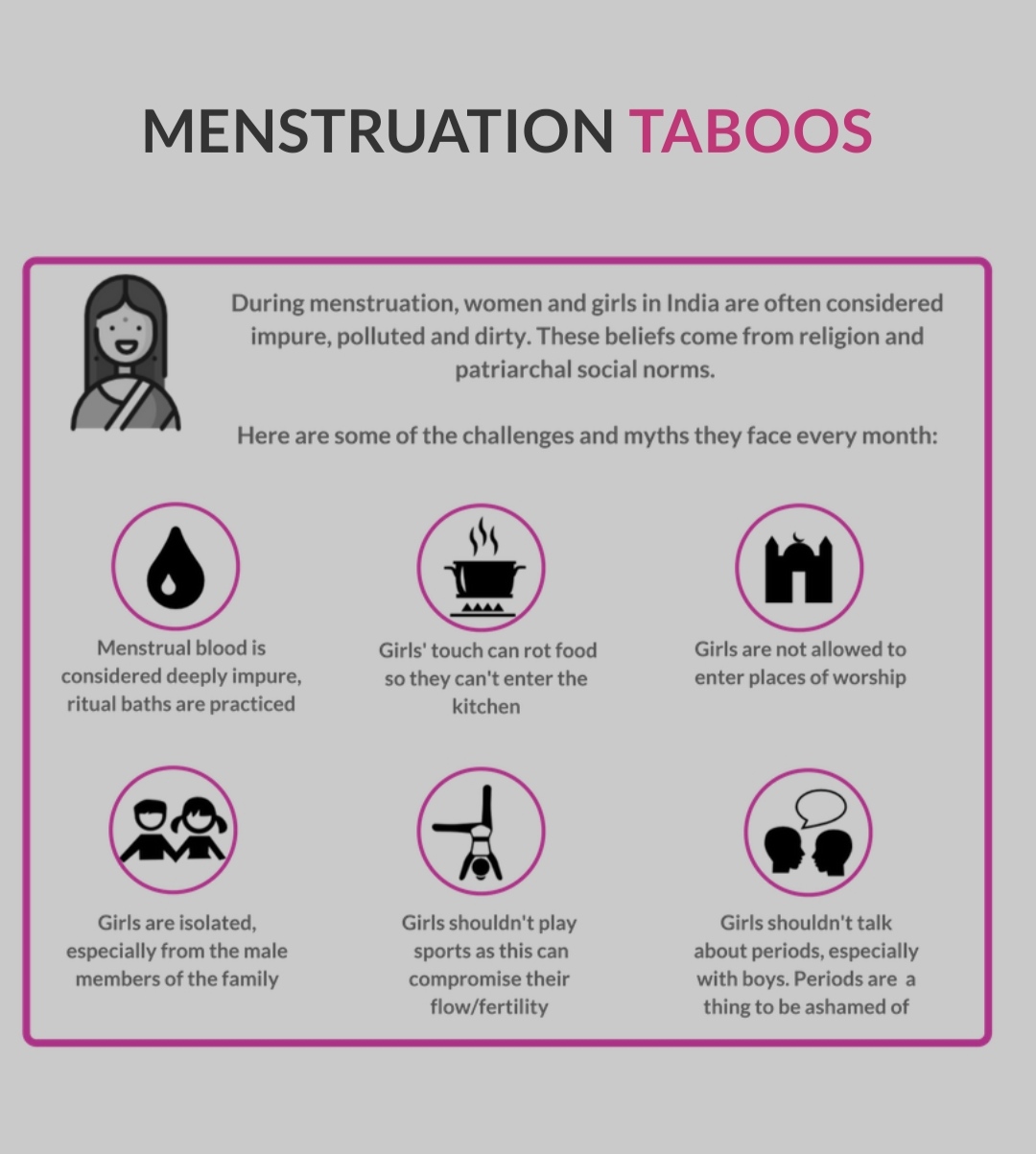Menstruation Challenges In India

A woman’s menstrual health is crucial to her well-being and also to the well-being of her family and community. But too often — especially in the developing world — mindsets, customs and institutional biases prevent women from getting the menstrual health care they need. Menstrual hygiene continues to be amongst the most challenging development issues today.
Menstruation is associated with the onset of puberty in girls and many a times, it brings with it rules, restrictions, isolation and changed expectations from the girls by the society. This changed attitude towards girls such as restrictions on their self expressions, schooling, mobility and freedom has far reaching consequences on the mindset of women.
Menstruation is still considered a taboo in the Indian society. Even today, the cultural and social influences on people create a major hurdle in ensuring that the adolescent girls are given proper knowledge on menstrual hygiene.
Mothers are also reluctant to talk about this topic with their daughters and many of them lack scientific knowledge on puberty and menstruation.
The main reasons for this taboo still being relevant in the Indian society are high rate of illiteracy especially in girls, poverty and lack of awareness about menstrual health and hygiene. Only less than 18 per cent of Indian women use sanitary pads.
The latest National Family and Health Survey found that 58 per cent of young Indian women (15-24 years) use a hygienic method of protection (mostly sanitary pads), a significant increase from the 12 per cent using pads in 2010.
This is, no doubt, a consequence of greater attention to menstrual hygiene management over the past few years in India. This not only prevails in the Indian society but is a global issue.
On a global level, at least 500 million women and girls lack adequate facilities for menstrual hygiene management. Lack of adequate information on sanitation and hygiene facilities, particularly in public places like schools, workplaces or health centres can pose a major obstacle to women and girls.
Even today in many families freedom of women continues to be in the hands of patriarchal discourse. With the evolution of these cultures, there has not been any significant change in people’s attitudes and mentality towards menstruation.
In some families, menstruation is being perceived as an unclean or embarrassing thing, extending even to the mention of menstruation both in public and in private. Most girls even hide themselves out of fear or embarrassment on their way to a medical store, rather majority of them cannot afford to buy hygienic sanitary pads.
A large number of girls in many less economically stable families drop out of school when they begin menstruating. More than 77 per cent of menstruating girls and women in India use an old cloth, which is often reused, ashes, newspapers, dried leaves and husk sand during periods.
During their menstruating days, women are prohibited from participating in day-to-day activities. They are not allowed to enter the house. A woman must be “purified” before she is allowed to return to her family and they are forbidden from performing any rituals.
She is prohibited to enter the kitchen or a temple as people believe that anything she touches will go bad or rot. But the truth is that a menstruating woman is going through a natural and healthy biological process.
Become a Volunteer Today
– we are always welcoming passionate and hard-working volunteers who has hunger to serve for humanity so we would love to have you in our team.
News & Updates
FREE MENSTRUAL HYGIENE AWARENESS SEMINAR
As we know menstrual hygiene of India is really very poor, statics revile that on global level at least 500 million girls don't have access to hygiene menstruation products. Many skip school during their periods because they can't afford to wear pads. Menstruation is...
मुफ़्त मासिक महावारी स्वच्छता जागरूकता संगोष्ठी आयोजित
जयपुर। जैसा कि हम सब जानते हैं कि भारत में मासिक महावारी की स्वच्छता वास्तव में बहुत खराब है, आंकड़े बताते हैं कि वैश्विक स्तर पर कम से कम 500 मिलियन लड़कियों के पास मासिक महावारी स्वच्छता उत्पादों तक पहुँच नहीं है। कई लड़कियां अपने पीरियड्स के दौरान स्कूल छोड़ देते हैं...
जयपुर में महावारी स्वच्छता जागरूकता पर आयोजित हुई संगोष्ठी
जयपुर। वैश्विक स्तर पर कम से कम 500 मिलियन लड़कियों के पास मासिक महावारी स्वच्छता (Menstrual hygiene ) उत्पादों तक पहुँच नहीं है। कई लड़कियां अपने पीरियड्स के दौरान स्कूल छोड़ देती हैं क्योंकि वे पैड्स को खरीद नही पाती है। भारत में मासिक महावारी की स्वच्छता वास्तव में...
Get in Touch. Get Involved.
Don't hesitate to get in touch with us for any query, order or question. We'll come back to you as soon as possible!


